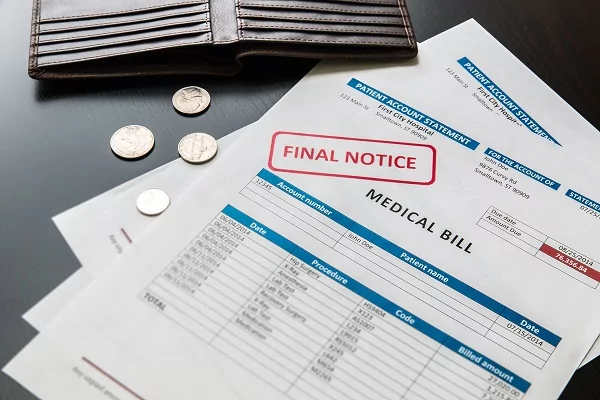Workers’ compensation is a crucial safety net designed to protect employees who suffer injuries or illnesses while performing their job duties. In theory, the system should provide timely financial support and cover medical expenses, allowing workers to recover without shouldering the financial burden. However, an alarming number of cases exist where workers find themselves grappling with unpaid medical bills despite being covered by workers’ compensation. This article aims to shed light on the reasons behind workers’ comp not paying medical bills, the challenges faced by affected individuals, and potential solutions to rectify this issue. Lets more understand Workers comp not paying medical bills.
Understanding Workers’ Compensation:
Workers’ compensation is a state-mandated insurance program that provides benefits to employees who sustain work-related injuries or illnesses. The primary purpose is to cover medical expenses, rehabilitation costs, and a portion of lost wages for the injured worker. In exchange for these benefits, employees typically forfeit their right to sue their employer for negligence.
Reasons for Unpaid Medical Bills:
Despite the intended purpose of workers’ compensation, several factors contribute to cases where medical bills go unpaid. Some of the key reasons include:
- Claim Denials:
- In some instances, workers’ compensation claims are denied, leaving injured employees without the financial support they desperately need.
- Denials can occur due to various reasons, such as insufficient evidence, missed deadlines, or disputes over the legitimacy of the injury or illness being work-related.
- Medical Treatment Disputes:
- Workers’ compensation insurers may contest the necessity of certain medical treatments or procedures, leading to delays or denials in covering those expenses.
- Differences in medical opinions regarding the severity of an injury or the appropriateness of specific treatments can further complicate the process.
- Employer Resistance:
- Some employers may resist acknowledging the legitimacy of a workplace injury, especially if it reflects negatively on their safety practices.
- This resistance can lead to delayed or denied claims, leaving the injured worker in a precarious financial situation.
- Administrative Hurdles:
- The workers’ compensation process involves various administrative steps, and any errors or delays in paperwork can result in unpaid medical bills.
- Overburdened administrative systems may contribute to slow processing times, exacerbating the financial strain on injured workers.
- Insufficient Coverage:
- In some cases, workers may find that their employer’s workers’ compensation insurance does not adequately cover certain medical treatments or services.
- This can leave workers responsible for expenses that should, ideally, be covered under the workers’ compensation system.
Challenges Faced by Injured Workers:
Workers who experience unpaid medical bills due to issues with the workers’ compensation system often face significant challenges:
- Financial Hardship:
- Unpaid medical bills can lead to financial strain, making it difficult for injured workers to meet their basic needs, let alone cover additional medical costs.
- Health Complications:
- Delayed or denied medical treatments can result in worsened health conditions for injured workers, leading to longer recovery times and potentially permanent disabilities.
- Legal Battles:
- In some cases, injured workers may need to navigate complex legal processes to appeal denied claims or dispute medical treatment disagreements, adding stress and uncertainty to an already challenging situation.
- Psychological Impact:
- Dealing with the physical and financial consequences of a workplace injury can take a toll on an individual’s mental health, leading to increased stress, anxiety, and depression.
Potential Solutions:
Addressing the issue of workers’ comp not paying medical bills requires a multi-faceted approach involving stakeholders at various levels:
- Improved Education and Communication:
- Employers and employees alike would benefit from increased education about workers’ compensation processes and their respective rights and responsibilities.
- Clear communication between employers, employees, and insurers can help prevent misunderstandings and streamline the claims process.
- Streamlined Claims Processing:
- Governments and regulatory bodies should work towards improving the efficiency of workers’ compensation claims processing.
- Implementing digital systems, reducing bureaucratic hurdles, and ensuring prompt communication can expedite the resolution of claims.
- Enhanced Oversight and Enforcement:
- Regulatory bodies should conduct regular audits of workers’ compensation insurers and employers to ensure compliance with established guidelines.
- Swift enforcement actions against those who neglect their obligations can serve as a deterrent and encourage adherence to the rules.
- Mediation and Alternative Dispute Resolution:
- Introducing mediation and alternative dispute resolution mechanisms can help resolve disagreements over medical treatments or claims without resorting to lengthy and costly legal battles.
- Addressing Healthcare Disparities:
- Efforts should be made to address disparities in healthcare coverage under workers’ compensation. Ensuring that insurance policies cover a comprehensive range of medical services can prevent coverage gaps.
- Advocacy and Support Services:
- Establishing advocacy and support services for injured workers can provide them with the resources and guidance needed to navigate the complexities of the workers’ compensation system.
Conclusion:
The issue of workers’ comp not paying medical bills is a complex and multifaceted problem that requires the collaboration of employers, insurers, regulatory bodies, and advocacy groups to find sustainable solutions. Timely and comprehensive medical care is crucial for the well-being of injured workers, and addressing the root causes of unpaid medical bills is essential to uphold the principles of the workers’ compensation system. By fostering a culture of transparency, communication, and accountability, stakeholders can work towards a system that genuinely serves the interests of both employers and employees, ensuring that injured workers receive the support they need to recover and return to the workforce.
